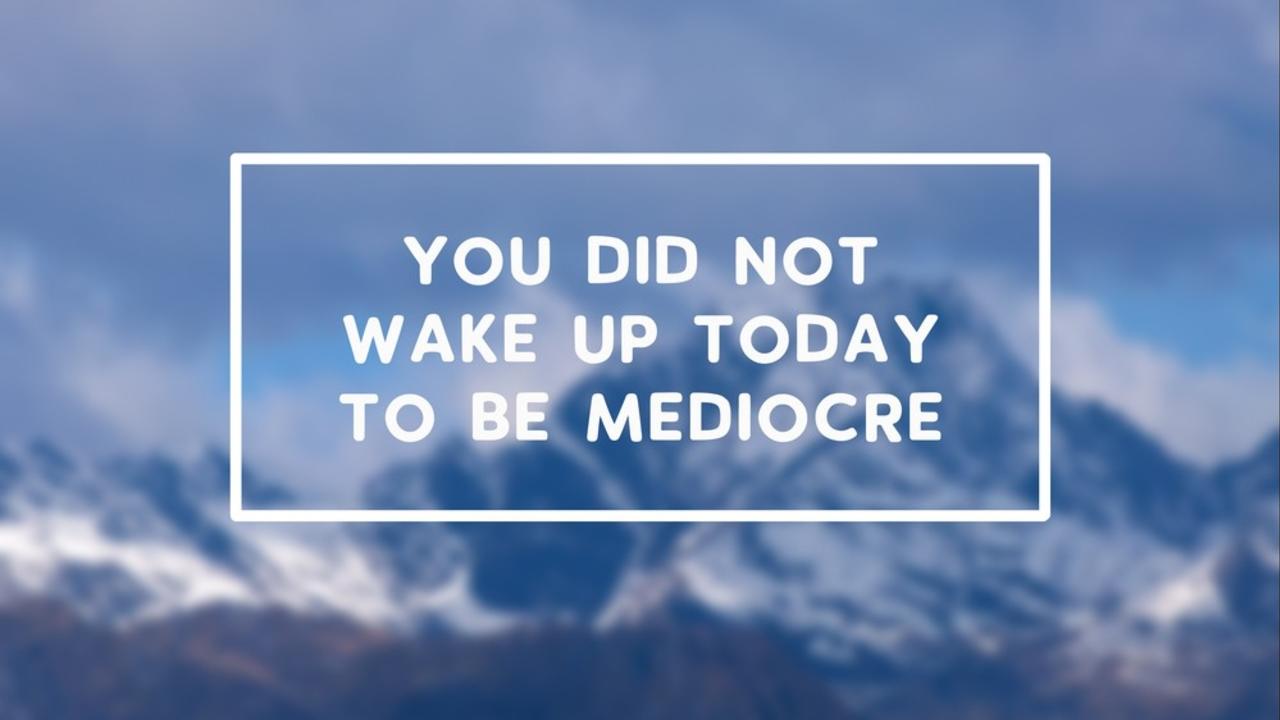Ever Regretted NOT Speaking Up?

Ever Regretted NOT Speaking Up?
(Scroll below to view the video)
Have you ever had a birthday come and go when you received nothing? No recognition, no card, no special dinner. Nothin'! That happened to me a while back, and it felt like I was invisible and no one cared. The reality was that the most important people in my life cared, but it somehow slipped their busy minds.
See, it’s a human drive to be acknowledged and validated. For example, "Happy birthday!" "Can we spend some time together?" "I made you a card that has a heartfelt note." etc.
When it comes to work, we can have greater influence on ourselves and our teams if we acknowledge our/their milestones... great and small. If we celebrate the process and not just the outcomes, such as making those follow-up calls, the trips to the gym, or trying that new recipe... rather than just the closed deals, weight loss or delicious meals prepared.
If we are not receiving what we need from our colleagues, management, family or fri...
Tired of NOT Being Heard?

Tired of NOT Being Heard?
(Scroll below to view the video)
Four years ago I got asked by a dear friend to sit on a panel for a Google Ventures sponsored event which was hosted by Autodesk. The topic was "Mental Toughness for Women in Tech."
I thanked my friend, and politely declined.
At the time and for the past 25 years, my clients were world-class athletes typically ages 16-22... not the best, brightest and most successful women in technology residing in San Francisco, Silicon Valley and beyond.
Full transparency, I was scared.
Why would they listen to me? I essentially helped the top 1% teens and young adults to be their best, consistently and under highly important or high stakes situations.
Thankfully my friend at Autodesk was persistent, and fortunately I decided that my voice deserved to be heard. I prepared extensively (and then even prepared a lot more), showed up, delivered, and my business was forever changed... especially after I heard this from one of the attend...
3 Key Learnings from Women in Cloud Summit 2019

3 Key Learnings from Women in Cloud Summit 2019
(Scroll below to view the video)
I am so excited! I spent all day at the Women in Cloud Summit 2019 at Microsoft, learning from over 1,000 of the country’s top technologists and tech entrepreneurs and doing a book signing for ZONED IN.
Let’s talk about a couple of the things from the book that resonated most with these amazing women and which are important to all of us.
- The importance of long-term clarity:
Not just your one-year goal, but your five-year goals. This has less to do with what tasks will you accomplish and more to do with how you want to be remembered or what legacy you want to create. Once this is dialed in (It can be hard to do, but there is a process to figure it out!), you have the platform to create the reality for yourself, your team or for you family. - Discovering how you want to feel in your days:
I shared tips, tools and habits how to take control of work-life balance, how to slow down your days (Yes.. this IS po ...
3 World-Class Secrets to Persevere (When You Want to Quit)

3 World-Class Secrets to Persevere (When You Want to Quit)
(Scroll below to view the video)
After researching, studying and working with the Top 1%, I’ve learned that there are are similarities and differences between world-class performers and everyone else. Everyone experiences anger, fear, frustration, and doubt. Everyone. There’s one important difference though that, that sets the best apart from the rest. It’s that world-class performers are intimately and vividly aware of what they want and why they care so deeply.
Maybe you’ve heard that before, but do you know how to uncover your why?
Your real why.
Regardless of what your next level of ambition is, it might be hard. Maybe really hard. What will get you to your next finish line or to your own personal Olympics is being intimately aware of why you care about it. This will prove as your biggest cheerleader, and it will extend a lifeline when you want to quit.
We’ve all wanted to quit, right?
It will help you persevere when...
4 Easy Steps to Set Yourself Up for Consistent Progress

4 Easy Steps to Set Yourself Up for Consistent Progress
(Scroll below to view the video)
Happy New Year 2019 everyone! Here's wishing you beautiful moments, treasured memories, and all the blessings a heart can know.
Ralph Waldo Emerson wrote, "Write it on your heart that everyday is the best day of the year." I want to pass along some easy steps to help you make progress everyday towards the goals and ambitions you want and deserve.
World-class athletes and business professionals do not achieve and maintain greatness alone, and neither can you. Accountability is one way you can set yourself up for consistent progress on your march towards your Olympics.
So how do you choose the right peer, friend, or colleague as an accountability buddy?
Well, they should be:
- More experienced than you (ideally)
- Have your best interests at heart
- Not in competition with you in any way
- Not threatened by you
It’s also important to take care of some housekeepi...
World-Class Tips to Stay Sane and Happy During the Holidays

World-Class Tips to Stay Sane and Happy During the Holidays
(Scroll below to view the video)
I’m not sure if your holidays are all jolly smiles, presents flowing and family getting along famously. Let’s just say when I was young, I really looked forward to January. Now, I LOVE having kids home, traveling, exchanging gifts and volunteering this time of year, but it can still be stressful at times.
There’s one thing world-class athletes do that we can all learn from to have the most enjoyable and relaxing holiday possible.
They rest and renew.
Yep, that’s it. The most successful and prolific athletes make sure to rest and recover, often. Why do you think John McEnroe (am I dating myself?) crashed and burned and Roger Federer is still going strong? Rest and intentional time for calm.
Here are a couple tips for you to have the most sane and happy winter break you and your family deserve:
1). Take Breaks During the Day:
When you are home with a lot of family, at holiday gatherings
...
How to Focus on What Really Matters

How to Focus on What Really Matters
(Scroll below to view the video)
Do you ever get distracted and veer off from what’s most important? Of course, that’s a trick question. We all do, especially this time of year!
You might wonder how world-class performers have laser-like focus when it comes to their long-term vision and their short-term progress. Thankfully, there are tools we can all learn, so we can have remarkable focus too and achieve what may have (at first) seemed not possible.
Here are a couple tips to get started:
- For Long-Term Focus: Create a Personal Manifesto,
Olympians are remarkably clear about their future ambitions, and they visit them often. They visualize what they want in an extremely vivid and visceral way, and they are consistent about bringing their future self and their future experiences to life.
Here’s a example from my book (ZONED IN: The Mental Toughness Required for a World-Class YOU) that explains this point:
Months and even years before the Rio Gam ...
It's Time to Stop Feeling Mediocre

It's Time to Stop Feeling Mediocre
(Scroll below to view the video)
I hope everyone enjoyed a relaxing Thanksgiving break with family and friends.
I'm 100% blown away by how amazing YOU already are!
Here’s what I’m hearing though over and over again from my local and global workshop attendees... as well as those applying for my monthly subscription:
Despite all the amazing things they are doing... “I feel mediocre.”
I hear you.
I’ve felt that way too.
If we work extra hard, we feel like we are mediocre with our loved ones and friends. If we commit to our family, our career ambitions might slow down. Here’s the worst: We work extra hard at both, and still feel like we are coming up short:(.
I'd like to share three valuable tips to STOP feeling mediocre and get onto feeling (as Jen Sincero of You are a Badass so eloquently puts it) like your badass self at work AND at home.
- Create your circumstances and the person you want to become NOW.
Write your personal manifesto to yours ...
Are You Ready?

(Scroll to the bottom to view the video.)
I want 2019 to be different for you. It’s time to take control of what you want, plan for it, and make clear and measurable progress. Period. Here’s the thing. The planning and foundation starts now (not in January.)
It’s been proven in science that there are a couple things we must do to make clear and measurable progress towards what we want, so I created the 7 Day Mental Toughness Challenge. I teach it to world-class athletes, teens, senior leaders, and CEO’s of the household, so they can dream, plan and achieve their best. Now, it’s YOUR turn! What if you have already completed it? No problem. Let’s do it again to help you next-level whatever is important to you.
Just download your FREE 7 Day Mental Toughness Challenge, and we are off to the races!
Day 1 is "One Person":
We have spoken about accountability recently, but who will be your challenge partner and why will this person be a great cheerleader for you? World-class performers sha...
How NOT to Feel Mediocre at Work and/or at Home

How NOT to Feel Mediocre at Work and/or at Home
(Scroll below to view the video)
I recently led a workshop for 15 brilliant men and women. Total transparency, the room was a downright intimidating group of mainly female senior engineering, technology, and mathematics influencers. Despite some pre-game jitters for me, the workshop was engaging, impactful, and even fun!
The topic was: How to Speak Up and Use Unconscious Bias to Your Advantage, and we spent our time specifically on Emotional Control and Influence.
Their #1 Challenge: How not to feel mediocre at work and/or at home.
Due in part to unconscious bias and part to being a minority (either women or men who are atypical of being STEM leaders) in their field, these mostly PhD’s who were published, departments heads, and changing the world for the better, felt mediocre at work AND at home.
Here are a few tips to help you be and feel like you are world-class in your career and at home.
- Gain clarity on what ‘success’ means a...



